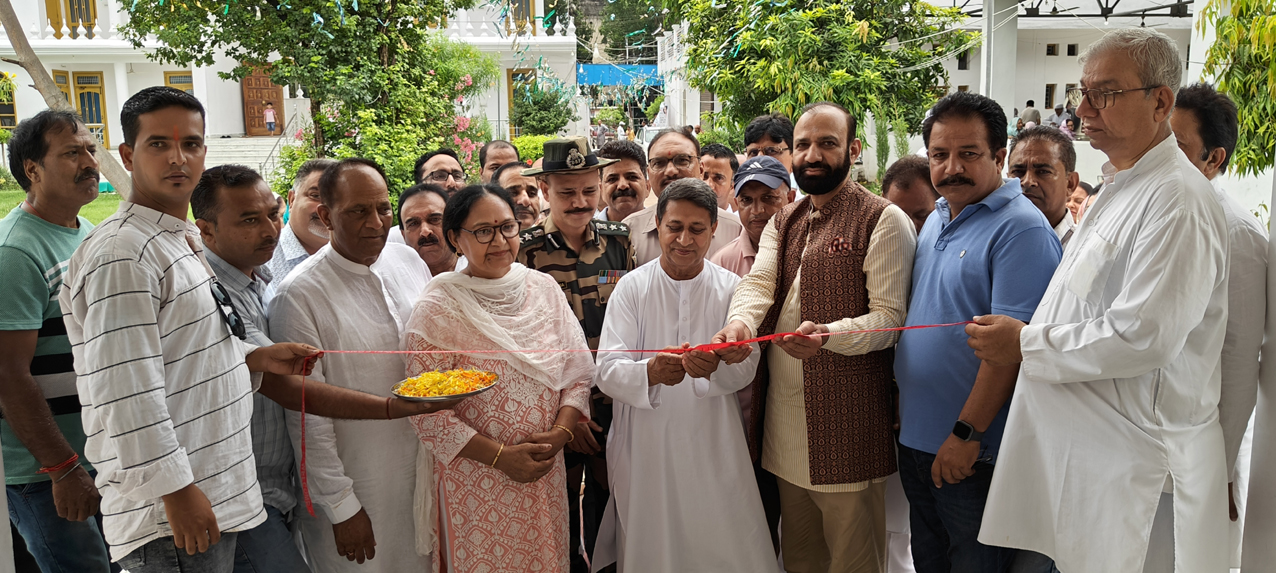 Early Times Report Early Times Report
JAMMU, July 6: To Aware the common populace about the ill effects of cardiovascular diseases Head Department of cardiology GMCH Jammu Dr Sushil Sharma held a day long cardiac Awareness cum health Check up Camp in association with Punjab Kesari Group in memory of late Smt. Swadesh Chopra at Udas Marg Sanstha R S Pura, Jammu to educate people about importance of cardiac friendly diet so as to prevent future morbidity and mortality. The Camp was inaugurated by Shri Bhagwan Dass , Guru Mata Bimla Devi, Dr Sushil Sharma along with Gharu Ram Bhagat (MLA Suchetgarh) , Ajay Sharma (Commandant 165 BT BSF) and prominent members of the Sanstha.
While interacting with the people Dr Sushil stated that Emerging insights in nutrition and preventive cardiology reveal that the Mediterranean Diet and the Planetary Health Diet despite their distinct cultural and philosophical foundations offer remarkably similar advantages for promoting longevity, metabolic health, and environmental sustainability. Individuals who consistently follow either dietary pattern tend to experience lower rates of all-cause mortality, reduced incidence of cardiovascular diseases, improved glycemic control, and overall better health markers. These diets emphasize nutrient-dense, plant-forward eating: abundant in fruits, vegetables, legumes, whole grains, nuts, seeds, and healthy fats such as olive oil, while restricting red meat, processed foods, and added sugars. This balance of macronutrients and micronutrients not only protects against chronic illnesses but also enhances gut health, reduces systemic inflammation, and supports healthy aging.
He elaborated that Beyond individual health, these dietary models are equally notable for their environmental impact. Both diets involve a significantly lower reliance on animal-based and highly processed food products, which are major contributors to greenhouse gas emissions, deforestation, and biodiversity loss. By prioritizing sustainable agriculture, seasonal produce, and mindful food consumption, they offer a blueprint for reducing one's ecological footprint. While the Mediterranean Diet has roots in centuries-old traditions of Southern Europe, centered on balance and community-based eating, the Planetary Health Diet is a modern framework informed by global sustainability goals. Yet both converge on the principle that what nourishes the human body can and must respect planetary boundaries.
He added that the Mediterranean model encourages shared meals, mindful eating, and cultural connection, which has been shown to improve mental well-being and adherence. Similarly, the Planetary Health approach promotes awareness of food origins, ethical sourcing, and global responsibility encouraging individuals to see eating as a conscious act rather than a routine habit. Importantly, these diets are not exclusive or elitist, and can be adapted to suit a wide range of cultures, economic contexts, and culinary preferences. Whole grains, legumes, vegetables, and plant-based proteins are affordable and accessible components in most regions.Moreover, the integration of these diets into healthcare systems, school programs, and public nutrition campaigns can play a transformative role in population-wide health outcomes. Physicians, dietitians, and policy makers have the opportunity-and responsibility-to lead this change by promoting food environments that make healthier, sustainable choices the default. This includes advocating for plant-based meals in hospitals, regulating misleading food marketing, and ensuring that vulnerable populations are not left behind in the transition toward dietary sustainability, he said
|
